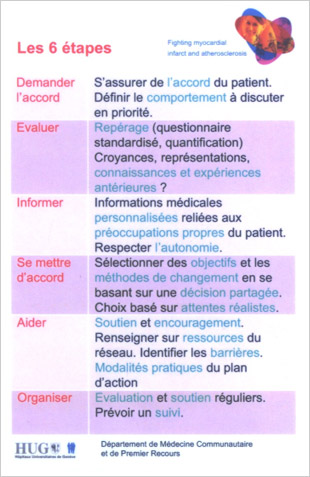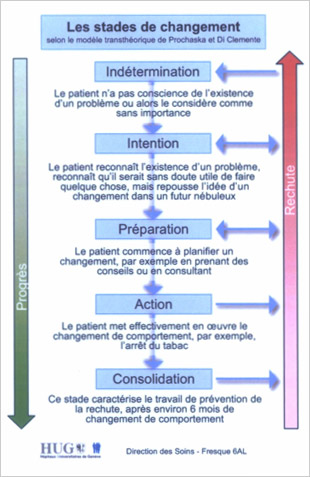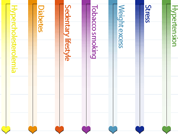« We are better persuaded, ordinarily, by reasoning that we have developed ourselves, than by that which has come to other peoples’ minds »
Pascal (1623-1662), Pensées
- What is the motivational interviewing?
- Motivational interviewing used by health care providers in cardiology
- The brief motivational intervention
- Spirit and principles
- Guidelines for motivational interviewing
- A useful tool: the wall chart
- Terms for success
- To learn more
What is the motivational interviewing?
Motivational interviewing was developed during the eighties by the psychologists William Miller and Stephen Rollnick. It is “a guided interview centered around the patient to encourage them to change behavior by helping them to explore and resolve their ambivalence when faced with change” (Miller and Rollnick 1991).
This method is intentionally instructional, aimed at resolving ambivalence and therefore helping with change. Its aim is to create and amplify, in the patient’s eyes, a difference between their behavior and their reference points or their overall objectives. Motivational interviewing honors and respects the individual’s autonomy and freedom of choice. It is designed to resolve questions relating to motivation, when these specific issues prevent a change in behavior.
When can it be used
This method has been extensively used in addictology, but it’s use is spreading to other areas: diabetes, nutrition, weight loss, therapeutic adhesion, high risk sexual behavior etc. Its impact on cardiovascular risk factors is also documented.
The motivational interviewing used by health care providers in cardiology
At the HUG, a project to improve the prevention of cardiovascular risk factors has been developed within the context of the hospital's management of inpatients with cardiovascular disease. This project uses information presented in various ways, including pictures in a wall chart, as well as using motivational interviewing with patients.
A real benefit to both patients and health care providers has been observed, even if this approach is new for many health care providers.
The idea for future training in motivational interviewing is planned not only for health care providers in cardiology but for all professionals who may at some stage be involved in patient care, whether it is in the intensive care unit, in cardiology or during the cardiac rehabilitation phase.
This training will be given to physicians and nurses in wards where patients stay for longer periods of time; for other health care providers such as physiotherapists, nurse aides, dietitians, sports teachers, physicians and nurses, intensive care personnel, training will be provided as brief motivational interventions.
The brief motivational intervention
This is an intervention that lasts 5 to 20 minutes during a routine consultation where the patient is made aware of their ambivalence with respect to change, and they are given the appropriate information to achieve a goal set by the patient, and carried out in a motivational style.
For the brief motivational intervention, the health care provider relies on the 6 step guide:


Indications for the motivational interviewing
- When a change in behavior is needed
- When a person is ambivalent with respect to change
- When one would like to help with preparing for change
- When one wants to lower resistance to change
- When one wants to impart an interpersonal style
Spirit and principles
Spirit
- Give the patient freedom of choice
- Respect and encourage the patient’s autonomy
- Try to understand, accept and give value to the “client’s” point of view
Principles
- Show empathy
- Develop the existing difference between patient's situation and actions and their personal values
- Validate and encourage the feeling of personal effectiveness:
- it is essential and crucial to help the patient in their process to change
- if the person has no hope or no trust in their ability to change, he/she will not begin to change
- Play with resistance:
- avoid direct confrontation
- suggest without imposing
- make use of emerging resistance to modify the intervention strategy: take a step back, move faster, slow down…
Conditions for success
The outcome of the motivational interview is robust and persistent when it is incorporated at the start of treatment
- it increases respect for the treatment
- it increases adhesion to treatment
- it increases motivation as perceived by health care providers
To learn more
- AFDEM (Association francophone de diffusion de l ’entretien motivationnel) (Francophone association for distributing the motivational interview)
- Motivational Interviewing
- L’entretien motivationnel.- Miller W et Rollnick S.- Dunod, 2006 (trad. Michaud et Lecallier)
- Motivational Interviewing. Preparing people for change.- W. Miller & S. Rollnick.- Guilford Press, 2002
- Health Behavior Change, a guide for practitioners.- Rollnick S. et al. Churchill Livingstone.
